Blog Feed
Shark Week Toolkit
// This Toolkit is in progress.
// Have suggestions for what should go in here?
// Get in touch
Welcome to your home for shark-saving resources to help you defend, protect and celebrate sharks online during Shark Week (starting Sunday, August 12 at 9pm ET)!
There's a lot in here, so we've packed all the action-y goodies at the top, and pushed the background information to the end.
Table of Contents
I. Being a Super Engager
- How To Drive The Shark Conversation (Without Jumping It)
- -- Tips for effectively engaging online during Shark Week
- State of the Shark Online (“the Sharkinar”)
- -- Recording, Slides, and Notes from our Shark Week online briefing
- Myth-busting Resources
- -- Rapid Response Kit for Busting Shark Myths (particularly on twitter)
- Allies, Organizations and Campaigns
- Tips for Twitter and Facebook
- The best-est shark photos and videos to share and amplify
II. Background Information
- Shark Week 101 (Wikipedia) (By the Numbers)
- Shark Week Schedule
- Shark Week’s online campaign plans
- Shark Week Official Online Channels:
- -- Twitter | Facebook | Tumblr | Website | GetGlue (Social TV app)
- -- How to Engage Online with Shark Week [per Discovery]
Shark Week 2012: How To Drive The Shark Conversation (Without Jumping It)
Update: Want a personal walk-through of the State of the Shark online? Join Son of Sharkinar on Friday, August 12 at 11:00 am PT/ 2:00 ET. We'll share Shark Week campaign plans as well.
Shark Week 2012 is fast approaching. If you're involved in the online conversation about sharks, Shark Week represents a major opportunity to grab some attention, and extend your social media reach. Just how big is this opportunity? And what can you do to best leverage it? Using Upwell's magic "Big Data" 8-Ball, and salty nautical insight, we're going to give you the answers.
Shark Week Is Big
In a typical week, Upwell measures between 40,000 and 70,000 mentions of sharks online. During Shark Week 2011, there were over 740,000 social mentions of sharks, 95% of which were directly attributable to Shark Week.
There's no escaping it: Shark Week is responsible for the single largest bump in the online shark conversation for the entire year.
When you see that fin-shaped spike, it's time to get into the (social media) water.
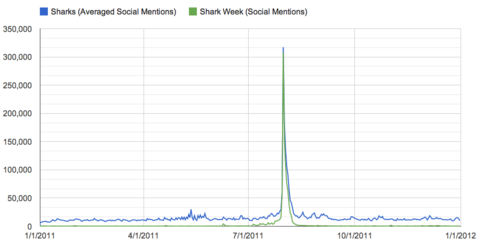
And Getting Bigger
Since 2009, total social mentions of Shark Week have increased by a factor of five every year. If that trend holds, this year's Shark Week could generate over 2,000,000 social mentions. Now you're talking attention apex predator!
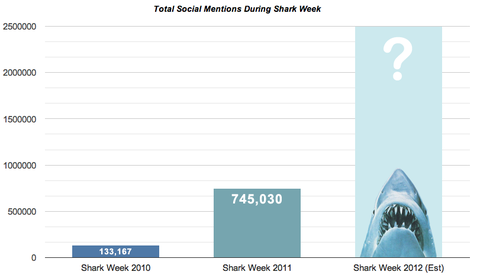
Sentiment
Of course, mentions in and of themselves are only helpful if the information or sentiment they express is factual or positive. While Shark Week unquestionably promotes strong conservation messaging, does that break through the notion of sharks being eating machines with big teeth that occasionally kill or injure humans?
Fortunately, yes, We broke down those 740,000 Shark Week-related social mentions into three categories:
- Celebratory — e.g. "Sharks are awesome!"
- Terror — e.g. "Sharks are violent killers!"
- Conservation — e.g. "Sharks are endangered!"
And as this pie chart shows, a very significant majority were in the celebratory camp. (or as we call it, ‘Yay!’)

While Terror remains a popular theme in Shark marketing (Sharketing?), it's increasingly begun to receive a negative response from audiences, particularly online. Perhaps this due to the abundance of more accurate and less sensational information about sharks that's available on the Internet. Or perhaps it's a consequence of twenty-five years of Shark Week helping to change our broader cultural attitudes about the humble elasmobranch. In any case, Terror isn't a theme we reccomend that shark conservation orgs resort to, for obvious reasons.
If you want your shark content to reach the widest possible audience, "Sharks are awesome" (or beautiful, or fascinating, etc.) is the theme to use.
Which Shark Week Hashtag is the Most Popular?

With over 88% Share of Voice, #SHARKWEEK is by far the most widely used Shark Week hashtag.
There are a variety of other popular Shark Week related hashtags, most linked to a specific campaign (like Discovery's fun #PhotoChomping and #Chompie photo sharing campaigns) or event (like #VWsharkweek, Volkswagen's mobile, VW-shaped shark cage).
Mentions of these various hashtags are likely to increase as Shark Week approaches. But if you want to ensure that your content reaches the greatest possible number of shark-interested online readers, the #SHARKWEEK hashtag is clearly your best bet.
In Summary
- Shark Week is the biggest single spike in the online shark conversation for the entire year.
- The most popular theme for shark content and sentiment is Celebratory. People think sharks are awesome. (They are!)
- The most popular Shark Week hashtag is #SHARKWEEK
- If you're involved in the online shark conversation and want to reach a bigger, broader audience, Shark Week is an incredible opportunity to do so.
- Follow the top influencers, start Tweeting and Facebooking, and join the conversation!
A #sharkweek Sharkinar is so much more delightful than a webinar
This morning, we're convening some of the top social minds in sharkiness to talk #sharkweek. THE SHARKINAR IS UPON US.

Defending Sharks Online During Shark Week
If you talk about sharks online, please join the crew of activists, scientists, bloggers, journalists, super-tweeters, and nonprofits at 11am PST/ 2pm EST to discuss how we can change the Shark Week online conversation together.
During the sharkinar we’ll:
• Share Upwell’s “State of the Shark” conversation, and our online shark conversation baseline data
• Discuss your Shark Week plans, and provide resources to support each other’s campaigns
• Provide tips for increasing the volume of shark conservation mentions online
Register now for the Sharkinar.
Sharkinar resource round up
- Follow The Sharkinar Twitter List
- Live notes from the Sharkinar: http://bit.ly/sharkinarnotes
- Upwell's Shark Week Toolkit (link to come)
- State of the Shark Online (slides, recording and blog post to come)
- Top Shark Influencers
- Sharkinar Recording (link to come)
Who's Influencing the Shark Conversation Online?
We're just days away from Shark Week - the annual catalyst of by far the single biggest surge in cartilaginous conversation online. In recognition thereof, and in to complement our Sharkinars, we compiled a list of some of the most effective and influential drivers of social media shark discussions. Read on to learn more about our picks.
Subscribe to Upwell's "Shark Influencers" list on Twitter to keep tabs on these influencers from the comfort of your own Twitter feed.
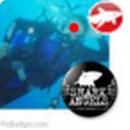
Alisa Schwartz
@divefinatic
Followers: 3,991
Klout Score: 66
Twitter Bio: Scuba diver & outspoken marine conservationist w/focus on sharks. No Blue = No Green. Total Ocean Devotion here! Follow @sharkangels too! #savesharks
Website: http://www.sharkangels.com
Alisa is one of the most engaged individuals posting online about shark conservation, tweeting many times daily, including mutiple article and news links.
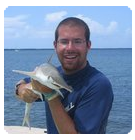
David Shiffman
@WhySharksMatter
Followers: 6,722
Klout Score: 54
Twitter Bio: I am a shark conservation biologist and blogger. I support science-based management, sustainable fishing, and do not support direct action.
Website: http://southernfriedscience.com
David is one of the most active of shark experts in social media, frequently engaging his followers in conversations on science and policy and compiling some of those discussions in Storify form. he is also a frequent blogger at Southern Fried Science.
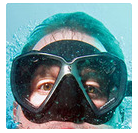
Dr. Alistair Dove
@para_sight
Followers: 1,368
Klout Score: 51
Twitter Bio: Director of Research/Conservation at Georgia Aquarium. Blogger at DeepSeaNews. In love with the diversity of life in the oceans. Views my own.
Website: http://www.alistairdove.com · http://www.deepseanews.com/
A marine biologist and parasitologist who has studied many aspects of aquatic animal health, Alistair now specializes in the biology of whale sharks.
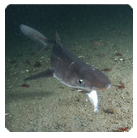
Chuck Bangley
@spinydag
Followers: 366
Klout Score: 48
Twitter Bio: Grad student and wanna-be shark expert.
Website: http://www.yalikedags.southernfriedscience.com
A specialist in the interactions between marine apex predators and fisheries, Chuck provides a good description of his work and the importance of outreach through social media in this interview with Bora Zivkovic following the ScienceOnline 2012 conference earlier this year.

Rob Stewart
@teamsharkwater
Followers: 5,777
Klout Score: 44
Twitter Bio: Biologist, shark lover, photography and documentary filmmaker. Creator of Sharkwater, founder of non profit @uc_revolution working on second movie, Revolution
Website: http://www.sharkwater.com
Rob boasts a wide presence online, not just through his own Twitter handle but also that of @uc_revolution (the website of which is www.unitedconservationists.org), an organization that among other things campaigns against shark finning. His documentary, Sharkwater, received numerous awards. Also involved in Shark Angels (see below).

Neil Hammerschlag
@DrNeilHammer
Followers: 449
Klout Score: 40
Twitter Bio: Professor at University of Miami; Sharks Oceans Research; Education & Conservation. Views my own.
Website: http://www.neilhammer.com
Conducts research on many aspects of shark and shark conservation; publishes with great frequency in the scientific literature but also has become a real 'go-to' scientist on sharks, shark behavior and shark conservation for print and broadcast media.
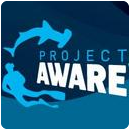
Project AWARE
@projectaware
Followers: 8,930
Klout Score: 49
Twitter Bio: Protecting Our Ocean Planet - One Dive at a Time
Website: http://www.projectaware.org
Engages scuba divers across the world to become involved in two principal project areas: marine debris, and protection for manta rays and sharks.

Shark Truth
@SharkTruth
Followers: 2,150
Klout Score: 43
Twitter Bio: A grassroots nonprofit dedicated to promoting awareness & action for sharks (sans #sharkfin). Home of HappyHeartsLoveSharks Tweeters @claudiali @ei_van
Website: http://www.sharktruth.com
Founded by Chinese Canadian activist Claudia Li, Shark truth focuses on the Chinese-Canadian community, using social media and other grassroots efforts to bring about an end to the use of shark fin soup in wedding ceremonies and elsewhere.

Shark Defenders
@SharkDefenders
Followers: 2,182
Klout Score: 48
Twitter Bio: Shark Defenders is dedicated to creating shark sanctuaries and supporting the proper management of shark and ray species worldwide. #FinSanity
Website: http://www.sharkdefenders.com
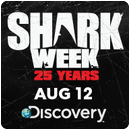
Shark Week
@SharkWeek
Followers: 70,041
Klout Score: 65
Twitter Bio: Jawsome. Coming to you August 12th.
Website: http://www.sharkweek.com/#mkcpgn=twdsc5
Of course, we have to include Shark Week itself, which is promoted widely across social media platforms, including Twitter, Facebook and Tumblr, as well as Discovery's own dedicated sites.
Not Enough Shark for You?
Outside of our top ten, of course, are multiple other individuals and organizations tweeting and engaging online wholly or partly on matters shark-related.
Shark Savers (Sam Whitcraft)
@SamWhitcraft
Followers: 1,273
Klout Score: 66
Twitter Bio: Conservation Biologist
Website: http://www.sharksavers.org
Captain Chris Wade
@theseawatch
Followers: 605
Klout Score: 63
Twitter Bio: Jump aboard, mateys, and follow the Captain and crew's adventures on the R/V Sea Watch - the Shark Boat! Lets save the sharks!
Website: http://seawatchchronicles.wordpress.com
Pew Environment
@pewenvironment
Followers: 1,860
Klout Score: 54
Twitter Bio: We work globally to establish pragmatic, science-based policies that protect our oceans, preserve our wildlands, and promote the clean energy economy.
Website: http://www.pewenvironment.org
Shark Savers
@sharksavers
Followers: 3,895
Klout Score: 42
Twitter Bio: We are raising awareness, educating people, bringing organizations together and empowering a grassroots effort to protect and sustain sharks on a global scale.
Website: http://www.sharksavers.org
Founded in 2007 by a team of divers, Shark Savers is working as a conservation partner with Discovery Channel for Shark Week.
Stop Shark Finning
@stopfinning
Followers: 5,923
Klout Score: 43
Twitter Bio: Shark fin soup could mean the end of sharks. Join me and stop shark finning.
Website: http://www.stopsharkfinning.net
Shark Angels
@sharkangels
Followers: 2,454
Klout Score: 40
Twitter Bio: The Shark Angels are leading a grassroots movement to save sharks... and we need your help.
Website: http://www.sharkangels.com
Attention Lab Digest - Week of July 30.
(Thank you to Liana Wong, one of our illustrious Upwell interns, for helping write this post!)
We're getting busier and busier at Upwell, and cataloguing everything we do is getting a bit tough! So we're going to try something new this week with the wrap post, and touch on our top 5 highlights of the week. Each week we are going to include in our list of 5 the biggest successes we had as well as some of our failures. We'll be explaining what we learned from our successes and our failures. Of course, if you are interested in what else we did, or want to know what happened with something you saw in the Tide Report, feel free to reach out to us!
1. Making Sustainable Seafood Sexy
As if the Olympics weren't exciting enough, we found out earlier this week that London 2012 is serving sustainable seafood for participants and attendants of the Games. Their goal is to become a "Sustainable Fish City" with the Sustainable Fish Legacy attributed to London 2012.
A quick Topsy search for "sustainable seafood olympics" shows that there's not much news coverage of this story. The news coverage that exists has been shared on Twitter only a small handful of times. Cory Doctorow once noted that "conversation is king. Content is just something to talk about." With that in mind, Upwell considered how to create conversation around a piece of content that wasn't getting much attention. Learning from our recent successes with images, we started thinking about what the classic British icons are. after a rather raucus brainstorm, we ruled out an Abbey Road image with fish in the place of the Beatles, and went for a couple quicker (and easier) icons that we thought would spark some conversation: a Buckingham Palace guard:
and the saucy David Beckham:
News about sustainable seafood may not be totally buzz-worthy, but slapping it over the image of a scantily-clad Beckham just might spark some conversation. Additionally, the Olympics hook didn't hurt. We try to find the "ocean angle" in conversations that are happening big (like we did with ocean acidification and the Rio+20 conversation). Much easier to add content to an existing conversation than to try to create content and a conversation all at once.
Aside from how much fun we had with this project, the most exciting discovery was seeing our assumptions proven corrent. On Greenpeace USA's Facebook page, the post of the Beckham image yielded 283 likes, 113 shares, and 40 comments - that's a lot of cod indeed. The Greenpeace blog post had an additional 91 shares and 1 tweet. The Keep Calm image was also shared on Twitter by Miriam Goldstein, and subsequent responses and retweets led to over 300 views of the image.
2. Deep Sea Coral Versus Shell
Greenpeace recently found abundant deep-sea coral at Shell's Arctic drill site. The soft coral Gersemia rubiformis, or the sea raspberry, will become vulnerable as soon as next week if Shell gets their way. Our response was to create an image macro depicting the lack of transparency from the oil giant.
Greenpeace shared this image on Facebook, resulting in 1,098 likes, 1,901 shares, and 52 comments.
Two big lessons jumped out at us from this campaign:
In retrospect, the loaded wording we used was more suitable for Greenpeace's online channels than other organizations that are active on Arctic issues, so it makes sense that Greenpeace was the one to share the image.
One aspect of these results jumped out at us - there were far more shares than likes. This is unusual on Facebook, and insinuates a higher than average level of engagement. The text on our image calls Shell out for their deception and secrecy - a negative message. We wondered whether people may be hesitant to click "like" because there's cognitive dissonance in "liking" an image that relays bad news. Many still clicked "like" because they found our image effective, but the high number in shares possibly indicates that users would rather spread the message than just click "like" as you would on a cute cat video (or a really handsome picture of David Beckham).
This hypothesis begs the question: do people share more when there's a negative message? If so, does this matter? It would be interesting to figure out whether major organizations use social media outlets to take advantage of this type of dissonance, its effects, and how we at Upwell could work with negative messages (but in a totally non-evil way).
3. Sharkinar - Living Every Week Like It's Shark Week
Only 9 more days until Shark Week is here! In honor of the longest running television cable program, Upwell is busy preparing for our Sharkinar on August 7th, 2012. It will be a virtual gathering of shark advocates to bring attention to conservation efforts online.
The prep work required to make this event sharktastic is incredibly time-consuming, but our prep work for this event is a great example of Upwell's unique role in the ocean conservation world. Because we are working outside the structure of a normal organization, we are able to identify and hopefully fill gaps that could be useful to ocean communicators.
We've curated some great content and Matt, Aaron and our interns Liana and Paulina have been consumed with gathering the data which will all go towards delivering an insightful and fun Sharkinar for you all! We don't know which direction our campaign efforts will go in, but what we are seeing is a real opportunity -- this is a big conversation and we want to amplify it.
We shared some teasers for the Sharkinar in our email invitation and Tide Reports this week - check them out.
In case you were wondering, here's a list of organizations that have already signed up for our Sharkinar. Don't forget to sign up yourself!
Humane Society
Smithsonian
Ocean Portal
Project Aware
Mission Blue
Oceana
Ocean Conservancy
Pew Environmental Group
Shane Research Institute
SeaWeb
Speaking of sharks, it was my birthday on Tuesday and I got a jawsome shark backpack - don't get too jealous!
4. No One Dished to the Daily Beast!
In Monday's Tide Report, we shared recent coverage in Andrew Sullivan's blog on the Daily Beast about sharks, and asked our readers to ask the Daily Beast to continue to cover ocean issues. We were hoping to get a crew of ocean advocates to thank them for paying attention to the important issue of shark finning. We sent our own pitch over to the Daily Beast as well. We got a favorable response from the Daily Beast, but none of our readers followed suit.
We are wondering why our readers didn't jump on the bandwagon. Some theories we're throwing around include:
- It's a big ask to have our readers do traditional pitching, compared with asking them to share pre-made material on social media channels.
- It's possible that many of our readers aren't used to pitching blogs, and do not do that in their everyday work.
- The piece about the Daily Dish was buried in our Tide Report and had few clicks - perhaps people just didn't read it.
We'll be trying this again in the future, perhaps with a different angle. If you've got some ideas, send them our way.
5. #S(h)aveTheWhales and Bruno Mars
Talking To The Moon... and now about whales? Singer-songwriter Bruno Mars tweeted this week with a curious hashtag: #ShaveTheWhales. Yes, shave. It comes from a clever t-shirt on Threadless featuring a sperm whale rocking a luscious brown beard.
We aren't exactly sure why Bruno Mars decided to start spreading this hashtag on Twitter, but it's gotten more people to talk about #SaveTheWhales, the actual whale-loving cause.
This odd phenomenon taught us yet again that a celebrity with such a large social media platform can make real difference around a conservation cause, even inadvertantly. It brings into question the power of the celebrity and what great things can come of it. Ultimately, the boost in the #savethewhales hashtag came not from Bruno Mars, but from his fans. Did Bruno activate some level of latent whale-love in the pop-loving masses? If so, how can this be leveraged again, potentially for sharks during shark week?

/index.jpg?itok=fjoXmQg0)
/index.png?itok=ewyuUC9m)